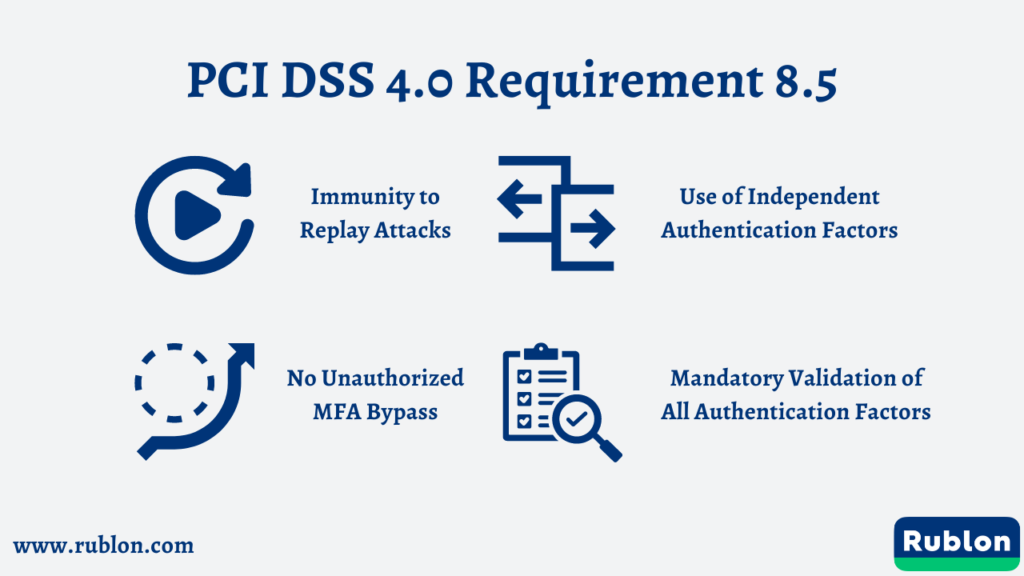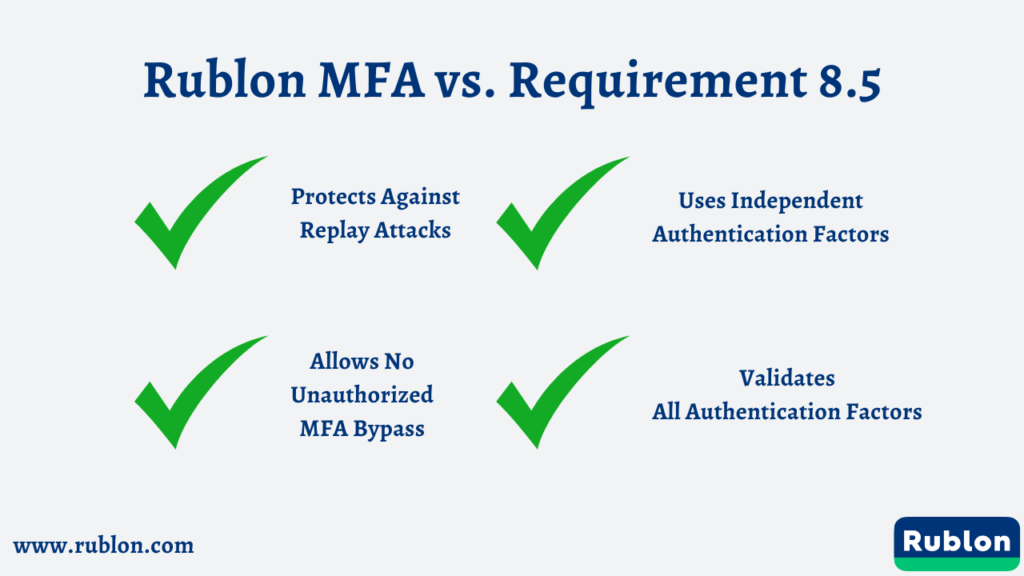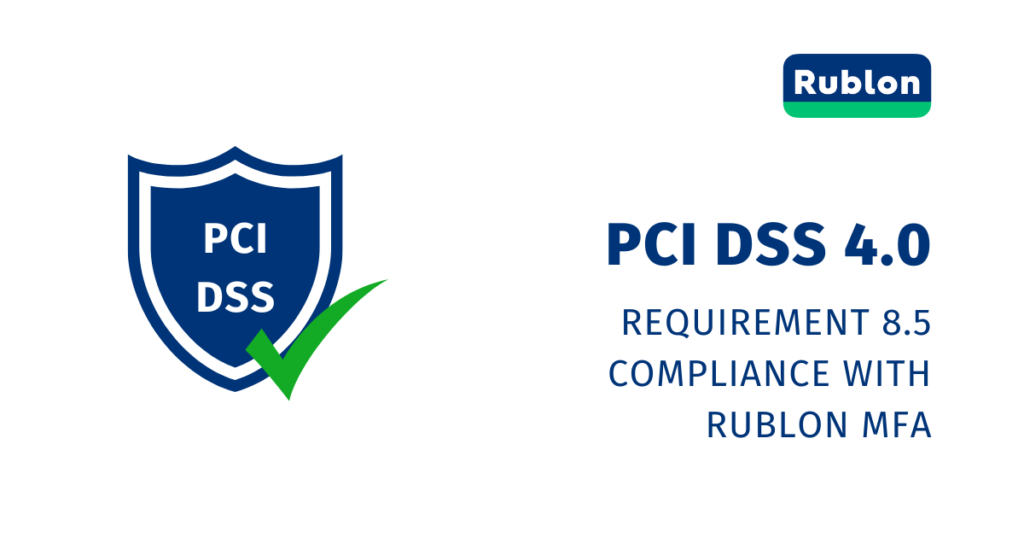Last updated on October 30, 2024
The Payment Card Industry Data Security Standard (PCI DSS) 4.0 reflects a growing need for robust security by introducing new requirements, including Requirement 8.5. This requirement focuses on the proper configuration of Multi-Factor Authentication (MFA) systems to ensure they are not susceptible to misuse. In this article, we will explore how Rublon MFA aligns with PCI DSS 4.0’s Requirement 8.5, providing a comprehensive multi-factor authentication solution that meets these stringent security standards. If you need to comply with PCI DSS 4.0 to protect your financial systems, this is a must read.
What is PCI DSS 4.0’s Requirement 8.5?
PCI DSS 4.0’s Requirement 8.5 mandates that MFA systems used to access Cardholder Data Environments (CDE) must be properly configured to prevent misuse. This requirement aims to address common vulnerabilities in MFA implementations that could be exploited by attackers. To comply with Requirement 8.5, an MFA system must meet the following criteria:

- Immunity to Replay Attacks:
The MFA system must be configured to prevent replay attacks, where an attacker intercepts and reuses authentication information to gain unauthorized access. - No Unauthorized MFA Bypass:
The MFA system must be configured to prevent any bypass, ensuring that no users, including administrators, can circumvent the MFA process unless explicitly documented and authorized by management under specific, time-limited conditions. - Use of Independent Authentication Factors:
The MFA system must employ at least two different types of authentication factors. This ensures that authentication is based on a combination of something you know (e.g., password), something you have (e.g., FIDO security key, FIDO2 passkey), and something you are (e.g., biometric data). - Mandatory Validation of All Authentication Factors:
Access should only be granted when all required authentication factors are successfully validated. Partial or incomplete authentication should not be allowed.
How Rublon MFA Ensures Compliance with Requirement 8.5
Rublon MFA is designed to meet and exceed the requirements outlined in PCI DSS 4.0’s Requirement 8.5. Here’s how Rublon MFA addresses each of the key elements of this critical security standard:

1. Protection Against Replay Attacks
Rublon MFA is designed to tackle replay attacks head-on, making sure that every authentication attempt is secure and one-of-a-kind. Replay attacks happen when a hacker intercepts a legitimate authentication session and tries to reuse it to break into your system. Rublon MFA uses Time-Based One-Time Passwords (TOTP) and WebAuthn/U2F Security Keys to provide strong defenses against these types of attacks.
Time-Based One-Time Passwords (TOTP)
TOTP works by generating a new, time-sensitive code every 30 seconds. After a code is successfully used, it can’t be used again, even if it falls within the same time window. Rublon MFA keeps track of the last successful code and blocks any attempts to reuse it, ensuring that intercepted codes are immediately useless. This approach makes it nearly impossible for attackers to gain access by replaying a captured code.
FIDO U2F & FIDO2 Security Keys and FIDO2 Passkeys
Rublon MFA takes security a step further with FIDO (Fast Identity Online) security keys and passkeys, which use phishing-resistant public key cryptography to enhance protection. With FIDO keys, the private key never leaves your device, so even if a hacker intercepts the data, they can’t use it because they don’t have the private key. Each authentication attempt is unique, thanks to the FIDO key generating a new signature for every session. This makes replaying an authentication session impossible.
FIDO keys also offer excellent phishing resistance by only working with legitimate websites. This prevents attackers from tricking users into providing their credentials on fake sites. Since FIDO keys are physical devices (“something you have”), they act as a 2nd factor in MFA, meaning an attacker would need both your password and the physical key to gain access. Unlike traditional methods, FIDO keys don’t rely on shared secrets between you and the service, so there’s no risk of those secrets being intercepted and reused.
2. Strict No-Bypass Policy
One of the key requirements of PCI DSS 4.0’s Requirement 8.5 is that MFA systems must not allow any user, including administrators, to bypass the MFA process unless it’s specifically documented and authorized by management under very limited and controlled circumstances. Rublon MFA allows enforcing a strict no-bypass policy to ensure that all authentication processes are fully enforced, providing robust protection against unauthorized access.
FailMode: Deny Option for Airtight Security
To strengthen security, Rublon’s connectors include a FailMode option that can be configured to deny access to any user who cannot complete the MFA process. By setting the FailMode to “deny,” organizations ensure that if a user fails to provide the correct authentication factors, access is completely blocked. This feature effectively prevents any potential bypass, providing airtight protection in line with PCI DSS 4.0’s no-bypass requirement.
Temporary Bypass with Bypass Codes
Rublon MFA offers a flexible solution for situations where temporary access might be needed. Administrators can issue Bypass Codes, which allow users to temporarily bypass MFA for a short period of time. This is particularly useful in scenarios where urgent access is required, but it still ensures that the bypass is controlled, documented, and time-limited to minimize security risks.

3. Use of Distinct Authentication Factors
Rublon MFA is designed to meet and exceed the requirements of PCI DSS 4.0’s Requirement 8.5 by ensuring that at least two independent authentication factors are always used. The MFA platform supports a broad range of authentication methods, making it easy to implement a secure, multi-layered authentication process. For example, users might be required to use a password combined with a Mobile Push notification when logging in to a VPN, or biometric data combined with a FIDO security key when accessing a Windows endpoint via Windows Hello. Each of these factors is distinct, contributing to a robust and secure authentication process that effectively protects against unauthorized access.
Out-of-Band Authentication (OOBA) for Enhanced Security
Rublon doesn’t stop at merely using factors from different groups. It also enhances security by enabling Out-of-Band Authentication (OOBA) when using the Rublon Authenticator mobile app. OOBA adds an extra layer of protection by requiring authentication through a separate communication channel, further separating the authentication factors. This approach aligns with the guidelines provided in section 5.1.3 of the NIST SP 800-63B Digital Identity Guidelines, which define Out-of-Band Devices as a secure method of authentication that significantly reduces the risk of man-in-the-middle attacks.
Versatility in Authentication Methods
Rublon MFA offers versatility in how authentication factors are applied across different systems and scenarios. Whether accessing cloud applications, on-premises servers, or remote desktops, Rublon allows organizations to tailor the authentication process to their specific security needs. This could mean combining knowledge-based factors (like passwords) with possession-based factors (like FIDO security keys) or biometric factors (like fingerprints). The ability to mix and match these methods provides a flexible yet secure authentication strategy that can adapt to different threat environments.
4. Complete Authentication Factor Validation
Rublon MFA is designed with a stringent approach to authentication, ensuring that access is granted only when all required authentication factors are fully validated. This means that every step in the authentication process must be completed successfully before a user can access the system. If even one factor fails or is incomplete, access is denied, leaving no room for partial or incomplete authentication attempts.
Rigorous Validation Process
Rublon MFA’s validation process involves multiple layers of checks to confirm the authenticity of each factor presented. For instance, if a user is required to authenticate using both a password and a FIDO security key, Rublon ensures that both the password and the key are validated against the system’s security protocols. The system does not proceed with granting access until it has confirmed that both factors are correct and meet the security criteria. This rigorous process eliminates the possibility of errors or bypasses that could compromise security.
Mitigating Risks of Partial Authentication
Partial authentication poses a significant security risk, as it could allow unauthorized users to exploit vulnerabilities in the authentication process. Rublon MFA can be configured to counter this risk by rejecting any authentication attempt that does not meet the full criteria. For example, if a user successfully enters a password but fails to insert and press the FIDO security key, the system will deny access, ensuring that only fully authenticated users can proceed. This approach aligns with PCI DSS 4.0’s Requirement 8.5, which emphasizes the importance of full authentication before granting access to sensitive data.
Seamless User Experience Without Compromising Security
While Rublon MFA maintains a strict policy of full authentication factor validation, it also ensures a seamless user experience. The system is designed to be intuitive and user-friendly, guiding users through the authentication process without causing frustration or delays. Users are clearly informed if an authentication step fails and are given the opportunity to re-authenticate, ensuring that the process remains smooth while still upholding the highest security standards.
The Importance of Compliance with PCI DSS 4.0’s Requirement 8.5
Compliance with PCI DSS 4.0’s Requirement 8.5 is not just about meeting regulatory standards. It’s also about ensuring the highest level of security for sensitive payment card data. Organizations that fail to comply with these requirements risk significant financial penalties and the loss of customer trust. Potential breaches of sensitive data are the final reason why compliance with PCI DSS 4.0 is paramount.
Rublon MFA provides the comprehensive, secure, and compliant solution that organizations need to protect their Cardholder Data Environments. By implementing Rublon MFA, organizations can confidently meet the rigorous standards of PCI DSS 4.0, ensuring that their systems are protected against the most common vulnerabilities and attack methods.

Start Your Free 30-Day Trial of Rublon MFA Today
Looking to enhance your organization’s security without adding complexity? Rublon MFA is the perfect solution. With our easy-to-use, robust Multi-Factor Authentication, you can protect your applications, VPNs, and remote access points from unauthorized access.
Why wait? With our Free 30-Day Trial, you get full access to all of Rublon’s powerful features—no strings attached. There’s no commitment required, and you’ll see firsthand how Rublon MFA seamlessly integrates into your existing systems, making security stronger and more convenient for your team.
Take the first step toward stronger security today! Start your free trial and experience how easy it is to safeguard your business with Rublon MFA.
Conclusion
Protecting access to your organization’s resources is about more than just compliance. It’s about real security in the face of ever-present cyber threats. PCI DSS 4.0’s Requirement 8.5 sets a high bar, but with Rublon MFA, meeting these standards is straightforward. Rublon’s robust security features and user-friendly design help ensure that you’re not just ticking boxes but genuinely strengthening your defenses.
Choosing Rublon MFA means staying ahead of cybercriminals and ensuring compliance with PCI DSS 4.0’s requirements. It’s about safeguarding your data, earning your customers’ trust, and gaining the peace of mind that comes from knowing your organization is secure and uses Multi-Factor Authentication (MFA) in a way that meets the highest industry standards like PCI DSS 4.0’s Requirement 8.5.